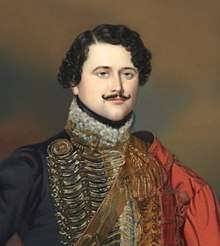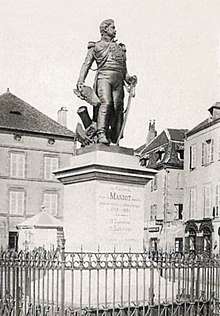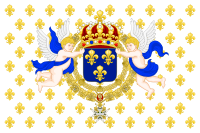Jean Baptiste Antoine Marcellin de Marbot
| Jean-Baptiste Antoine Marcellin de Marbot | |
|---|---|
 Marbot as colonel commander of the 7th Hussar Regiment in 1815 | |
| Nickname(s) | Marcellin Marbot |
| Born |
18 August 1782 Altillac, Kingdom of France |
| Died |
16 November 1854 (aged 72) Paris, France |
| Buried | Père Lachaise Cemetery in Paris |
| Allegiance |
|
| Years of service | 1799-1848 |
| Rank | Général |
| Battles/wars | |
| Awards |
Order of the Legion of Honour (Grand Officier) Order of Saint Louis (Knight) Order of Leopold (Grand Officer) Order of the Oak Crown (Grand Cross) |
| Relations |
Jean-Antoine Marbot (father) Antoine Adolphe Marcelin Marbot (brother) |
Jean-Baptiste Antoine Marcellin Marbot (August 18, 1782 – November 16, 1854), French soldier, son of General Jean-Antoine Marbot (1754–1800), who died in the defence of Genoa under Masséna, was born at La Riviere (Correze). His elder brother, Antoine Adolphe Marcelin Marbot, was also a military man of some note.
Biography

He joined the republican army as a volunteer in 1799. At the time there was no officer school for cadets. He rose rapidly to commissioned rank, and was aide-de-camp to Marshal Augereau, commanding the VII corps, in the war against the Kingdom of Prussia and the Russian Empire in 1806-7. After this he served with great distinction in the Peninsular War under Lannes and Masséna, and showed himself to be a dashing leader of light cavalry in the Russian War of 1812 and the German campaign of the following year. After a slow recovery from the wounds he had received at Leipzig and Hanau, he was promoted general of brigade by Napoleon during the Hundred Days, and took part in, and was wounded at, the battle of Waterloo.
He was exiled during the Bourbon Restoration and only returned to France in 1819, after which, however, his intimacy with the Louis Philippe I, Duke of Orléans secured him important military positions. After the July Revolution he was made maréchal-de-camp, and in this rank he was present at the siege of Antwerp in 1832. He was promoted lieutenant-general in 1836. From 1835 to 1840 he served in various Algerian expeditions, and in 1845 he was made a member of the Chamber of Peers. Three years later, at the fall of Louis Philippe I, he retired into private life.
Marbot wrote two pamphlets, Remarques critiques sur l'ouvrage de M. Lieutenant-General Rogniat, intitulé Considérations sur l'art de la guerre (1820), and La Necessité d'augmenter les forces militaires de la France (1825).
Napoleon read the first pamphlet while in exile on the island of Saint Helena. General Bertrand recorded in his diary on 14 March 1821:
"In the evening, the Emperor handed me Marbot's book, in which he had refuted the remarks of General Rogniat, and said: "That is the best book I have read for four years. It is the one that has given me the greatest amount of pleasure. Marbot had no access to my own refutation of Rogniat, but I would be glad to let him have it for a second edition. He has expressed some things better than I did, he was more familiar with them because, on the whole, he was more of a Corps commander than I. ... Throughout the book he never refers to 'the Emperor'. He wanted the King of France [Louis XVIII] to give him an appointment with the rank of colonel; that is quite obvious. He uses 'Emperor' once, so as not to look as though he were afraid to do so, or to appear cowardly, and another time he uses 'Napoleon'. He mentions Massena and Augereau frequently, and he has described the Battle of Essling better than I could have done it myself. I should have liked to show Marbot my appreciation by sending him a ring. If I ever return to active life, I will have him attached to me as an aide-de-camp. He's an educated man, who expresses himself simply, well, and correctly in writing."[1]
This pamphlet earned Marbot the distinction of being remembered in Napoleon's will:
"31. Item. To Colonel Marbot, one hundred thousand francs. I recommend him to continue to write in defense of the glory of the French armies, and to confound their calumniators and apostates."
Decorations

French decorations:
- Order of the Golden Fleece (
.svg.png)
- National Order of the Legion of Honour (
.svg.png)
- Officier (1813)
- Order of Saint Louis (

- Knight
- Royal Order of the Legion of Honour (

- Commandeur (1831)
- Grand Officier (1836)
Other decorations:
- Order of Leopold (
.svg.png)
- Grand Officer
- Order of the Oak Crown (

- Grand Cross
Memoirs

His fame rests chiefly, if not indeed wholly, on the memoirs of his life and campaigns, Mémoires du Général Baron de Marbot,[2] which were published in Paris in 1891, and in an English translation by A. J. Butler in 1892.[3]
Literary references
As with a number of other historical figures, Marbot figures prominently in the "Riverworld" cycle of science-fiction novels by Philip Jose Farmer. Marbot is first featured as the commander of Marines on Sam Clemens' riverboat, the Not for Hire. After the destruction of that boat and the death of its captain, Marbot joins the group led by famed English explorer Sir Richard Francis Burton and accompanies him on the journey to the head of the River. Accompanied by his lover, the English author Aphra Behn, Marbot reaches the Tower at the head of the River, only to die in combat when androids based on characters from Alice Through the Looking-Glass attack the guests during a Lewis Carroll-themed party.
Marbot is thought to be one of the models for Brigadier Gerard in the short stories by Sir Arthur Conan Doyle.
In Virginia Woolf's Mrs. Dalloway, there are several mentions of Clarissa (Mrs. Dalloway) reading Marbot's memoirs.
In R. F. Delderfield's To Serve Them All My Days. David, the main protagonist, gets comfort from Marbot's memoirs during his time in the trenches, and again on the death of his wife and daughter in a road accident.
References
- ↑ Napoleon at St Helena, Memoirs of General Bertrand, January to May 1821, Translated by Frances Hume, London 1953
- ↑ "Review of Mémoires du Général Baron de Marbot, 3 vols., 1891". The Quarterly Journal. 174: 95–126. January 1892.
- ↑ The Memoirs of Baron de Marbot, late lieutenant-general in the French Army, translated from the French by Arthur John Butler. 1892; 2 vols.
